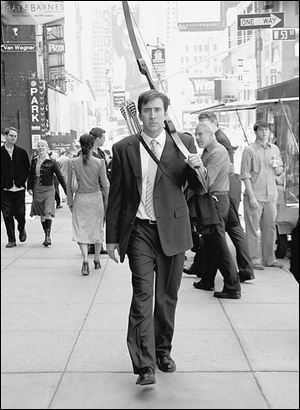
Movie review: The Weather Man ****
10/28/2005
TV weather man David Spritz (Nicolas Cage) goes to unusual lengths to get some respect from the people of Chicago.
Sir Robert Spritzel (Michael Caine), austere and caring and a Pulitzer Prize-winning author to boot, turns to his son with the goofy stage name, David Spritz (Nicolas Cage), a Chicago weather man with an aura of self-loathing, and, in a single sentence, both compliments and backslaps him using that withering Michael-Caine-death- rattle:
That is quite an American accomplishment, he says to his son who makes $240,000 a year to wave his arms before a green screen and read the weather, prepared behind the scenes by actual meteorologists.
Funny thing is, David is not even skilled with a green screen.
He knows this.
He knows he is lucky.
But it doesn t help the feelings of unworthiness, and the journey he takes from well-paid Chicago loser with an ex-wife (Hope Davis) and disaffected kids to well-paid loser slightly more content with his insignificance can only be considered one of those rare, strange Hollywood cases of negative affirmation viva la disappointment!
Thank God for clout.
The Weather Man odd, committedly downbeat, often wickedly funny is the kind of movie one gets to make at a studio these days only when one has made pictures that have made a lot of money very recently your having made successful pictures just eight years ago, for example, being not recent enough. What kind of cash have you contributed to my villa on Lake Como lately tis the Hollywood way.
Director Gore Verbinski has earned his box-office right to make a portrait of insecurity and middle-aged acceptance. The guy, a consummate stylist with an impeccable eye for chilly and melancholy visuals, recently made The Ring and the blockbuster Pirates of the Caribbean, and you know those movies made a lot of Hollywood executives happy because The Weather Man is that rarest creature: a big-budget studio production that offers the hero no redemption.
No obvious redemption.
Taking a cue from the woe-is-me-woe-is-America genre of metaphor-leaden drama that gave us American Beauty and Garden State, it s a miniature made on a gargantuan budget the sort of dyspeptic short story John Updike might have once had in mind, ballooned to encompass too many issues (pedophilia, lymphoma, teen smoking, etc.), and ultimately a little uncertain of what it wants to say. A director like Alexander Payne (Sideways) or David O. Russell (I Heart Huckabees) might have brought a firmer handle to a character with such a need for approval and craftier writing.
Verbinski, on the other hand, brings an unrelenting sense of anomie that those guys (fairly sunny, for indie filmmakers) are too generous to take too far. Shot in Chicago during the bleakest winter months, The Weather Man carries that muted feeling of an ice-blue December day when it gets dark at four in the afternoon. That pretty much describes Dave s inner life, as well.
He s spent his life seeking the respect of his father. His ex-wife does not wantVerbinski, on the other hand, brings an unrelenting sense of anomie that those guys (fairly sunny, for indie filmmakers) are too generous to take too far. Shot in Chicago during the bleakest winter months, The Weather Man carries that muted feeling of an ice-blue December day when it gets dark at four in the afternoon. That pretty much describes Dave s inner life, as well.
He s spent his life seeking the respect of his father. His ex-wife does not want to get back together. His daughter (Gemmenne De La Pena) is an overweight 12-year old developing a cigarette habit; his son (Nicholas Hoult, the boy from About a Boy, grown up) is getting too close to a predatory counselor. And nearly everything Dave does to help backfires. Then there s the odd issue of random Chicago citizens throwing things at Dave. Fast food, generally: chicken wings, burritos, shakes, Big Gulps. They do this because he s on TV, and because if you are on TV, people think you owe them something.
That sounds grim but Verbinski leavens the weight with an equally funny ability for showing how tiny annoyances in life set off large feelings. And he really gets at something near the end when Dave has to decide between accepting his disposable celebrity job and accepting that here is a cheap way of being rich, and rich is a lucky thing to be.
Not exactly your problems, or mine, but The Weather Man suggests a remarkable amount of discontent for mainstream Hollywood entertainment: As Dave says, you start life with a series of qualities you d like to have, and gradually those narrow and you find the ones that fit and eventually you re left with the ones you have and that is who you are.
He almost sounds content.